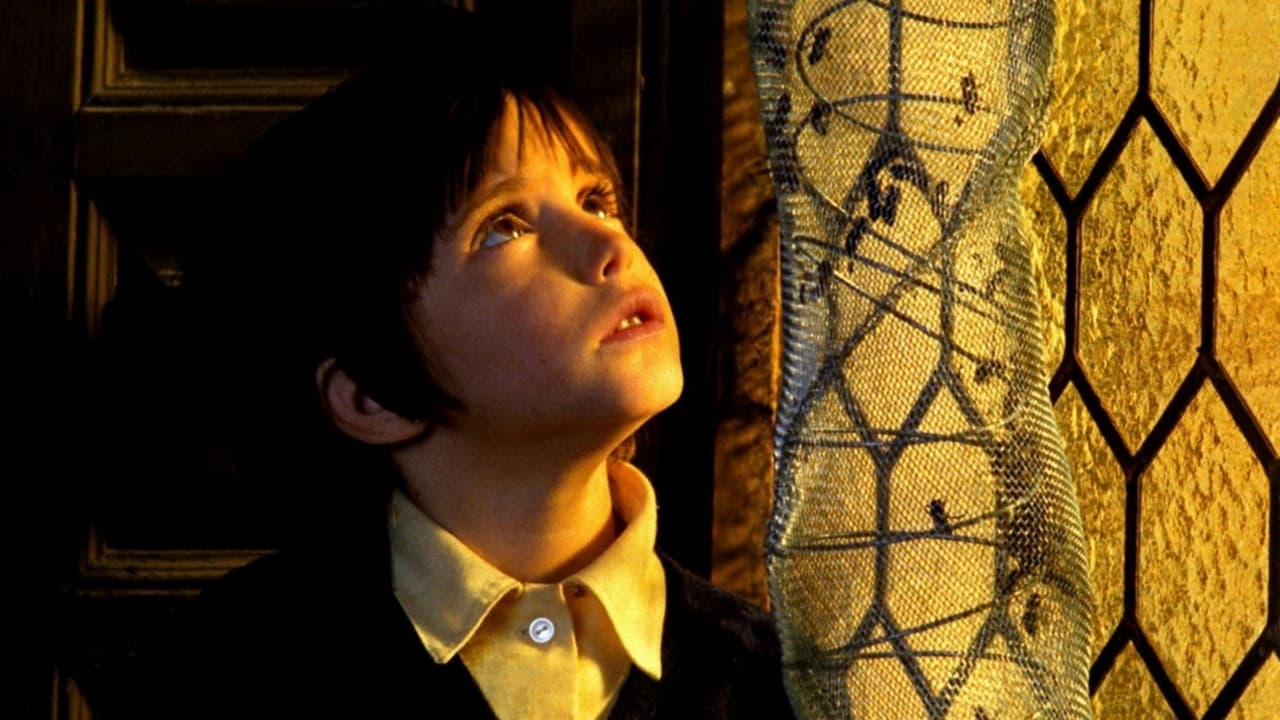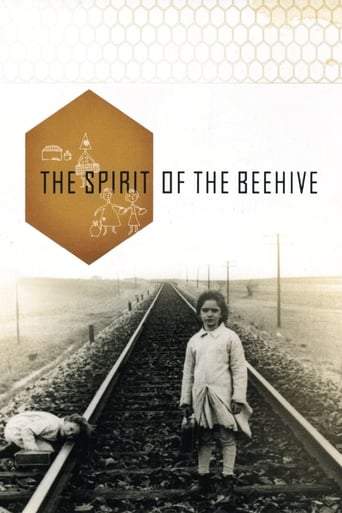



The Worst Film Ever
The film makes a home in your brain and the only cure is to see it again.
View MoreEach character in this movie — down to the smallest one — is an individual rather than a type, prone to spontaneous changes of mood and sometimes amusing outbursts of pettiness or ill humor.
View MoreAmazing worth wacthing. So good. Biased but well made with many good points.
View MoreMade at the height of the Franco regime, THE SPIRIT OF THE BEEHIVE has been read an an allegory of the Spanish Civil War and its aftermath, concentrating particularly on the destruction wrought amongst those who served in it and their families.Even for those viewers unacquainted with Spanish history, the film is pregnant with meaning. For those interested in the use of intertexts, director Victor Erice's direct quotation from James Whale's seminal FRANKENSTEIN (1931) introduces us to the idea of spirits and human (re) creation that dominates the narrative. Little Ana (Ana Torrent) is duped by her sister Isabel (Isabel Tellería) into believing that there lurks a spirit close by their isolated farmhouse who can be conjured up simply by wishing for its presence. Ana encounters a military deserter and believes that he is the spirit. Her discovery transports her into a dream-world where she re-enacts the famous sequence from Whale's film where the monster meets the young girl. In SPIRIT OF THE BEEHIVE the monster (José Villasante) does not kill Ana, but leaves her unable (or perhaps) unwilling to separate fantasy from "reality." Through such strategies director Erice forces to question our ontologies; do we really know what being "human" is, and can we separate this state of being from our imagination?This theme acquires a religious dimension through repeated shots of Jesus Christ surrounded by the Apostles and a human skull. In Christianity we are taught to place our trust in the Holy Spirit, but how do we know that this is a "good" spirit, as opposed to the "evil" spirit conjured up in Ana's mind. Erice leaves us with no answer.From thence it is but a short thematic step to reflect on Ana's father Don Fernando (Fernando Fernán Gómez) and his tendency to write his scientific discoveries about his beehives in a journal, in a manner similar to Colin Clive's Dr. Frankenstein in Whale's film. Does Don Fernando like to consider himself a Creator, performing experiments with bees rather than human beings? Or are they linked in some way? Erice emphasizes the parallels through shots of the patterned windows of Don Fernando's house, which are shaped much the same as the honeycombs in his beehives.The film's narrative unfolds slowly, with plenty of static shots in which characters move in and out of the frame. Light is an important element of the mise-en-scene, with our attention focused deliberately on the two little girls' faces, as well as those of their parents. This visual strategy once again forces us to reflect on what separates human beings from other species, spirits as well as bees.THE SPIRIT OF THE BEEHIVE is a highly complex work, whose sophisticated visual style and structure warrants repeated viewings. A true classic of European cinema.
View MoreI am proud to say that I have just added a NEW TOP FILM to my favorites list. :)The Spirit of the Beehive took me through probably one of the GREATESTEXPERIENCES of my life. Honestly, judging form the plot on IMDb, I did not think it would be that good. Now, after watching it, I declare it to be the MOST BREATHTAKING movie I have scene in a verrry long time.It is SET IN 1940, and LITTLE Ana and her older kid-sister, Isabel, venture around their Spaniard country-side where they attend school, go mushroom picking with their father, discover a deserted building, and most importantly, WATCH MOVIES at their local cinema house.Ana is mesmerized after watching the new film in town, James Whale's Frankenstein (1931), where her sister tells her lies to scare her even more of the monster. I love that while the movie is playing, they show the scene where Frankenstein's Monster encounters a little girl and is shown to be harmless by playing with her, but obviously the villagers will think otherwise.CHILDHOOD, in many ways, is one of the most beautiful things to portray on the big screen. Especially, because it is an adult re-creating these moments that have some similarity to their own youth (or I would hope so in Victor Erice's case); the innocents, freedom, imagination, energy, and even purity that comes from us when everything was so simple.****The girl who plays Ana put me to tears towards the end of this story. I could not help but get a little emotional, because not many directors can really show what it is like to be a kid again.
View MoreA sensitive seven-year-old girl living a small village in 1940 rural Spain is traumatized after viewing James Whale's "Frankenstein" and drifts into her own fantasy world.This film has the distinguish of being one of the few films that was symbolic of life in Spain under General Franco... at least while Franco was still alive. There is so much with the beehive metaphor and the isolation...I wondered if this film in any way inspired Guillermo del Toro's "Pan's Labyrinth". Both have Spanish children with monstrous friends escaping the horrors of the dictatorship... And a quick search proves my hunch correct. Del Toro has said, "Spirit of the Beehive is one of those seminal movies that seeped into my very soul." Such praise!
View MoreThe Spirit of the Beehive (1973)Seen just for what it is, a story of a little girl and her precious innocence in a world seeming to teem with quiet adult mysteries, this is a beautiful and somewhat slow movie. Sometimes a movie can be so evocative and transporting, the slowness is a gift, a necessary quality for being absorbed and lost in another world. And an elegiac world, sad and embracing and heavenly all at once.For me, thought, the slow pace began to weigh down the better parts of the movie, and in the simpler parts it become a distraction. In a few sections with somewhat awkward acting (a scene between the main woman, a kind of Nordic looking troubled soul, and a doctor, is glaringly bad), the movie showed its underbelly, which is really a bit full of itself. The metaphors are pushy and overused, the utterly sweet little girl the one unifying and transcendent element.Again, just seen for what it is, set in 1940 Spain (just after its civil war, and during WWII, though Spain largely avoided the war because it was thoroughly fascist by then) it is filled with isolation and desolate landscapes and a kind of loneliness that goes beyond isolation. The key, and important, twist at the beginning, the arrival of a copy of the 1931 American movie "Frankenstein" (dubbed into Spanish), is a penetration of this sadness from outside of Spain, and outside of the rural world of these simple villagers. The little girl is rapt, and her acceptance of the monster in her heart, almost literally believing in him, is a metaphor for wanting more than what life is going to offer, but getting more than other might expect simply by looking for it, reaching out for the gentle monster of your dreams.There are other metaphors, little ones like the out of tune piano, and large ones like the beehives, which inspire some inner monologues that push meaning far too hard. There is a second dim theme to the plot, about this woman having an affair that tears deep into her heart. There is a sense of flow to the movie, of broad horizons (the land is flat and barren), or repetition that builds on itself. It's a thoughtful movie, certainly, and a deliberate one, and a very slow one. It won't transport many viewers (though it has a growing and worshipful following among critics and movie buffs). I don't think the translation and subtitles were a problem. I saw it with a native Spanish speaker who was equally open to the movie's magic and equally dulled by its slow pace and its dwelling on small things far too long, as if taking for granted a patient and spellbound audience.So you might have to see the movie for what most viewers, especially younger ones, no longer understand: it is a metaphor and almost a protest against the continuing if weakening fascist government of Spain in 1973. It had been 35 years since the civil war tipped in favor of the fascists, and the oppressive government had squashed Spain's development as an economy and as an artistic culture all that time. This was a typical faint but legible response, filled with subtle hints of defiance, wrapped in mystery and analogy as a way of getting by the censors.But most of all, this is about human nature, beyond politics. It's about wanting more, about being alone in a family that should be very together. Enter with patience, and willingness to get lost in the mood of it all, because this is the soul of the movie, and it might just win you over.
View More